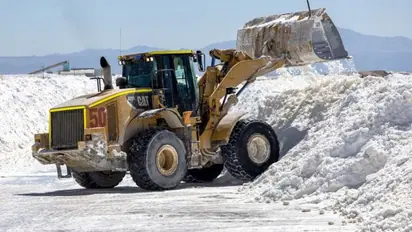Why the Lithium Triangle could reshape global dynamics

Synopsis
Over the next two years, Latin American nations are expected to increase their investments in lithium production. The promising opportunity to bolster regional and national economies through lithium mining is likely to motivate governments to intensify their efforts in expanding lithium production. Girish Linganna explains
Latin America, specifically the area known as the 'Lithium Triangle' or 'Trifinio', encompasses rich lithium reserves. Three countries within this region -- Bolivia, Argentina, and Chile -- possess a substantial portion of the world's lithium resources. Notably, Chile stands as one of the leading global producers of lithium and its second-largest producer in the world. This abundance of lithium resources positions Latin America as a pivotal player within the global supply chain. While the extraction of lithium presents promising economic prospects for these countries, it also gives rise to pressing environmental concerns, particularly with regard to water supply.
Moreover, the social implications of lithium extraction cannot be ignored, including issues surrounding land and indigenous rights, as well as the potential displacement of local communities. Given the expanding global demand for lithium and its role as a significant producer, the Trifinio region is expected to gain increased geopolitical significance in the next 24 months.
Latin America's Dominance: Argentina, Chile, and Bolivia control 60 per cent of global lithium reserves. Trifinio region holds 80 per cent of concentrated lithium in Brines. Brine refers to a concentrated solution of salt, specifically lithium-rich saltwater that contains valuable lithium ions. In the lithium industry, brines are an important source of extracting lithium for commercial use.
Lithium demand is set to skyrocket 40-fold in the next two decades amidst renewable energy and the electric vehicle revolution. With its abundant lithium reserves, the region emerges as a pivotal player in the global lithium market, conferring significant geopolitical importance upon it as a major lithium producer.
The potential for a lithium OPEC in South America could shape diplomatic ties, trade pacts, and international partnerships, as economists and leaders contemplate its impact on the global stage. Much like the Organization of the Petroleum Exporting Countries (OPEC), such a collaboration among major lithium producers in the region could wield substantial influence over the lithium market dynamics worldwide.
Latin American countries will likely invest more in lithium production in the next 24 months due to substantial economic opportunities. The potential to boost regional and national economies through lithium mining will serve as an incentive for governments to ramp up their lithium production efforts.
In 2023, the Chilean president revealed plans to introduce a bill for the establishment of the National Lithium Company, forming a key component of their fresh national strategy for lithium mining. Additionally, the president disclosed ongoing negotiations with over 40 investors from more than a dozen countries.
The Argentine government has set its sights on lithium, with two projects already in progress, and an additional 10 projects eagerly awaiting commencement. These initiatives are expected to attract investments totalling $4.5 billion.
In 2023, the Bolivian president made a historic declaration, stating that the industrialization of lithium in Bolivia was commencing with the leadership of the Catl-led consortium. The Chinese battery company Catl had recently secured a tender to exploit Bolivia's lithium reserves.
Lithium mining is expected to bring about adverse socio-environmental consequences, particularly concerning its impact on the local water supply and the well-being of the area's inhabitants. Lithium extraction necessitates an extensive amount of water, approximately 2.2 million litres per tonne of lithium. This poses significant challenges related to water stress in the affected regions.
Salar de Atacama is a vast salt flat located in the Atacama Desert of Chile. It is one of the world's largest lithium-rich salt flats and a significant source of lithium production. The region's unique geological conditions make it an ideal location for lithium extraction.
However, due to the increasing demand for lithium and the extraction processes involved, many people are raising concerns about the environmental impact, particularly regarding water usage. The accusation against lithium mining companies in the Salar de Atacama region stems from the observation that their operations are reportedly depleting the vital water reserves in the area by up to 65%. This has raised alarm about the potential negative consequences on the fragile local ecosystem and the communities relying on these water resources for their livelihoods.
Extraction of lithium from brines gives rise to concerns regarding potential contamination of local watersheds and its impact on biodiversity. In these areas, indigenous communities reside, relying on water for their primary economic activities. Historically, mining projects have not been considerate of their well-being and interests.
Check the Breaking News Today and Latest News from across India and around the world. Stay updated with the latest World News and global developments from politics to economy and current affairs. Get in-depth coverage of China News, Europe News, Pakistan News, and South Asia News, along with top headlines from the UK and US. Follow expert analysis, international trends, and breaking updates from around the globe. Download the Asianet News Official App from the Android Play Store and iPhone App Store for accurate and timely news updates anytime, anywhere.